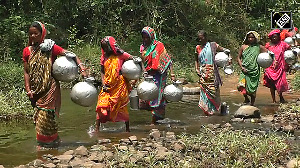 India has decided against becoming a member of the Organisation for Economic Cooperation and Development for now, but it is talking to the Paris-based body for expanding sectoral engagement.
India has decided against becoming a member of the Organisation for Economic Cooperation and Development for now, but it is talking to the Paris-based body for expanding sectoral engagement.
At present, India is only a member of various committees of the 34-member organisation.
The 50-year international organisation, which provides a forum to governments across the world to work together and stimulate economic progress and global trade, mainly comprises developed nations.
India, being an emerging country, feels it may not fit well into the 'rich men's club'.
It is also cautious about the signal it might send to other emerging countries in the South Asian region.
'OECD,' said a finance ministry official, 'is keen on getting India as a member, but right now we are just examining a more enhanced engagement with it, in consultation with line departments. There is a need to get more information on our strategic collaboration. We have to see how useful it is for us.'
OECD, representing more than 60 per cent of the world output, is inviting emerging nations such as India and Russia to become a member of it, so that it does not lose relevance.
It has also offered enhanced engagement to Brazil, China, Indonesia and South Africa.
A few developing nations like Chile, Hungary and Mexico became its members in 2010, 1996 and 1994, respectively.
Another official said OECD is a multi-faceted humongous organisation and if India decided to join it as a member, it would have to make certain commitments.
A country needs a good amount of human
The organisation has several areas, committees, documents rules, procedures which a member country has to sign up, he explained.
OECD also has a criterion for giving membership, which has been relaxed a few times on earlier occasions to include some emerging nations.
For instance, India's per capita income is lower than the OECD limit for its members, but the organisation has eased this criterion before for some other members.
The official, however, clarified that OECD was "very accommodative" and would be willing to relax the criteria for joining it as a member. It was for India to decide the level of engagement and terms, he added.
Currently, India collaborates with OECD on about 30 committees in areas such as taxation, transport research, chemical, pesticides, biotechnology, consumer policy, statistics, fiscal policy, steel and private pension.
The new areas of collaboration may include fiscal networks where countries can exchange policies on fiscal management.
Recently, OECD and India decided to enhance cooperation in dealing with issues relating to transfer pricing and promote better tax compliance and measures to improve the prevention and regulation of cross-border dispute.
India has been actively involved in the OECD Committee on Fiscal Affairs and its working parties since 2006.
It plays a lead role in the Global Forum on Transparency and Exchange of Information for Tax Purposes, and is an active member of the OECD's multi-stakeholder Task Force on Tax and Development. India recently became a full member of the OECD Network on Fiscal Relations Across Levels of Government.











 © 2025
© 2025